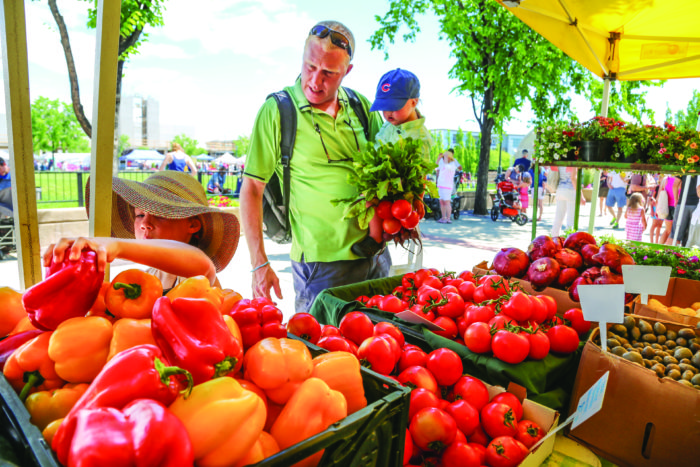
Ken Chapton shops at the opening day of the Stapleton Farmers Market with his children Sophia, 7, and Kellen, 1.
In the alleys, gardens, schoolyards and shared plots of NE Denver, fresh local food is taking root. No pesticides, no big agriculture—just the taste of what seeds, sun, water and soil can do.
“I have a theory that we are genetically predisposed to growing food,” says Bryant Mason, owner of Urban Farms Colorado, a landscaping company that builds and installs vegetable planters and urban gardens in the Denver and Boulder area. “Watching a tiny seed grow into an edible plant is astonishing every time it happens. It never gets old. Knowing that the process is making you a healthier person, a more connected individual and a more interesting neighbor makes gardening seem like a no-brainer. There is a bacteria in soil that releases serotonin in our brains. Kids love digging in the dirt. And most importantly, I’ve never seen an unhappy person eating a homegrown tomato.”
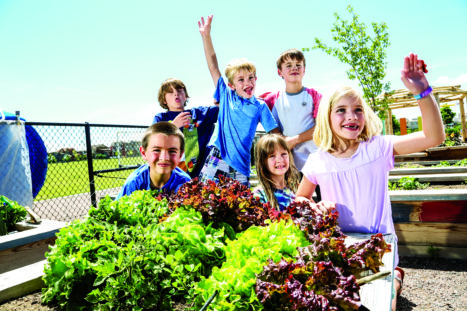
Swigert students and spring lettuce. Back: Joseph Norman, Finn Woolf, Zander Eliason. Front: Blake Thiel, Cecelia Harper, Kate Woolf.
Stapleton resident Logan Wilcox shares Mason’s sentiment. Wilcox is an advocate of organic farming both at home and at work, where among other duties he oversees the popular backyard food-growing program at Parkwood Homes in North Stapleton’s Conservatory Green neighborhood. “It’s fun for families and my kids really love it,” he says. “After a growing season they get to harvest and eat what they grew. And it makes them eat stuff they generally wouldn’t try. I’ll come home from work and the kids say stuff like ‘Dad we got new carrots today!’”
At local schools, including Bill Roberts E-8 and Swigert International in Stapleton, students in all grades get their hands in the soil and learn where their food begins. The gardens are a source of pride and scientific education. They are used as educational tools and are part of the curriculum. The garden programs allow teachers to bring science and community-building lessons into the classroom, and local businesses, including Ace Hardware on Colfax and Nick’s Garden Center in Aurora, sponsor and contribute supplies to the programs.
“We get everyone involved,” says Kim Duran, a first-grade teacher at Bill Roberts. “We assign a bed to each grade level as well as to staff and administration.” Bill Roberts started its garden program on Earth Day of 2015. With the support of the school’s administration and grants from the DPS sustainability team, the program has taken off to include planting and growing not only outside, but also in the classrooms using hydroponic grow towers.
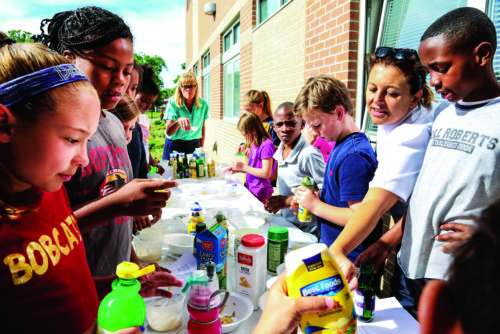
Chef Maggie O’Toole (white shirt at right), brings her culinary skills to Bill Roberts, where students learned to make their own fresh salad dressing on the last day of school this spring.
“Our goal is to serve fresh vegetables at the salad bar in the cafeteria and to give some food to families,” says Duran. “We like kids to be closer to the source of what they eat and to understand the entire process from seed to eating. A lot of DPS kids don’t have access to fresh food and don’t really understand the concept. When they learn how it works, they’re amazed. They are very observant of how much the plants change day to day. It’s great for their sense of inquiry. They notice all the little details, like how cucumber tendrils are attracted to light.”
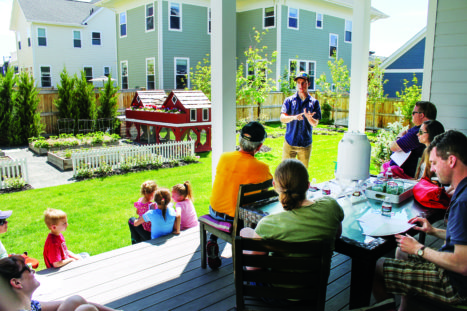
Bryant Mason, the owner of Urban Farms Colorado, leads a class on backyard farming at Parkwood Homes in North Stapleton’s Conservatory Green neighborhood. Photo courtesy of Logan Wilcox
“Both students and parents participate in the planning and growing and they love it,” says Jennifer Woolf, vice principal at Swigert International School. “And it spirals up in terms of involvement from grade to grade. We hold some great dinners using our fresh greens. Parents and friends of the school really look forward to it.”
The much anticipated Stanley Marketplace will feature a three-acre urban garden on site. Similar community gardens exist at The Urban Farm at Stapleton, Ekar Farm in Lowry (which donates all of its food to hunger-relief agencies), and in many local neighborhoods. Area residents grow a bountiful mix of greens, vegetables, herbs, fruits and spices. Based on the proliferation of planters of all kinds, some even on the grounds of existing local restaurants and apartment complexes, there appears to be no end to the passion for locally sourced eats.
While people mostly focus on growing fresh produce, in some cases food such as eggs and honey enter the equation. In 2014, the passage of the “cottage foods” code in Denver allows residents to sell many items from their homes, including uncut fruits and vegetables, whole eggs, and home-prepared food products such as jellies, jams, honey, teas, herbs, spices and some baked goods. The recent passage of a bill that, come August, allows homeowners to collect up to two barrels or 110 gallons of rainwater per household, is also a boon for backyard farming.
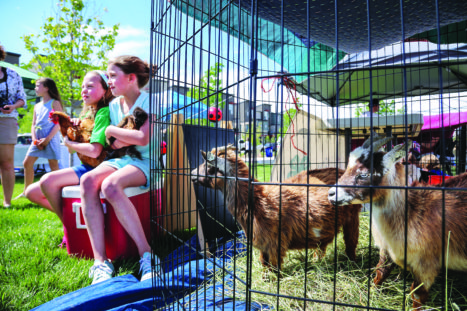
Claire Rowan, 9, (left) and Rosalie Libby, 10, hold chickens from The Urban Farm at the annual Rock the Co-op event in Conservatory Green. The event celebrates the future opening of Nourish Co-op.
“One of the things that Denver has done with the cottage gardens act is to really open up the opportunity to have food that is grown hyper locally in markets across town,” says Thomas Spahr, head of the board of Nourish Community Market, which was formerly named the Northeast Community Co-op Market, and a realtor who lives in Stapleton. “Aurora is interested in passing similar legislation. It empowers the community to grow their own food and even to make income off of it.”
Spahr, who studied community development in college, moved to Denver a decade ago from the San Joaquin Valley of California. He was dismayed by the lack of variety in local grocery stores and noticed a strong demand for local food. Since then he and Nourish have been actively pursuing the creation of a community-based cooperative store to provide sustainably harvested agriculture. Nourish, which is in the process of securing a permanent space for its vision, offers locally sourced food to its members as part of its fresh food box program that began in June.
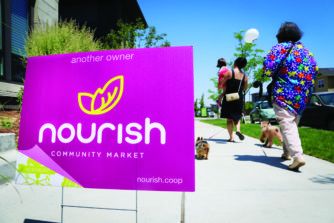
A sign for Nourish Community Market shows support for the popular local food co-op. Thomas Spahr, head of the Nourish board says, “We are still in lease negotiations. We hope to make an announcement by the end of the summer. Since the project is likely to be a new-build site, we are looking to open by the end of next year.”
“My mom was an immigrant from Thailand who started her own garden and that evolved into a small micro farm that grows and sells produce,” he says. “There’s no question the community benefits from having access to fresh food.”
Kim Soko Schaefer, who runs the food box program for Nourish, says it is temporarily based out of the Hangar 61 Fellowship Church, where members pick up the boxes every Thursday. “There will be signs directing people on what to pack in their boxes (how many tomatoes, heads of lettuce, etc.) and you do get to pick which pieces of produce in each box look best to you,” Schaeffer says. “There will also be a ‘for trade’ box where you can trade with other member-owners if you decide you’d rather have an extra tomato or two instead of a cantaloupe, for example.” The Nourish boxes are made out of a corrugated plastic and can be re-used over and over, season to season, to reduce their impact on the environment.
For more information, visit these websites:
Nourish Community Market: www.nourish.coop
The Urban Farm Company: www.urbanfarm.colorado.com
The Urban Farm at Stapleton: theurbanfarm.org
Ekar Farm and Community Garden: www.ekarfarm.org




Love the Front Porch and local food–glad you did this article. But…if that’s opening day at the Stapleton Farmers Market on the front page, those are not local tomatoes and peppers, which won’t be ripe in Colorado until mid-July at the earliest.